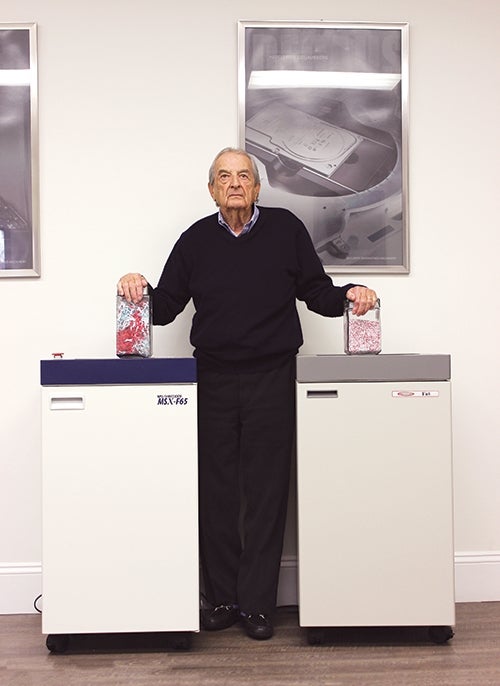Fifty years ago, Len Rosen founded Security Engineered Machinery, providing destruction for top-secret government documents and commercial clients.
How did you land government work?
It was during the time where air pollution in the country was becoming notable, and – at the time – the government was burning secret documents, which was causing pollution. We adapted a machine from the industry to chew up paper and circuit boards into very small pieces, which met the requirements of the government for total destruction.
Also, there was the tragic incident where one of our destroyers was attacked and taken over by the North Koreans. For certain hard communication devices, the destroyer crew was breaking them up with a hammer, which is not the way to do it. Our machine could do it, so later we introduced it into the government.
Are yours better than typical shredders?
Strips are not a good form of destruction, since you can put it back together. They are very voluminous. We deal with more sophisticated shredders. When the Iranians took over the American embassy in 1979, they spent months putting back together strips of paper.
How big is the market for destruction?
I would guess about $1 billion.
What challenges face your industry?
The biggest challenge is reduction of paper. The government especially – our biggest customer – is adapting to technology, and there is less paper generated. Our challenge is to make up for that by anticipating the technology of hard drives and designing machines to destroy information on hard drives.
So, how do you adapt?
We adapt to whatever changes are in the information world. There weren’t CDs when we started. Now, we can destroy cell phones, flash drives, tablets, laptops. We can destroy an iPad in 10 seconds.
We are in business to destroy.
What else do you destroy?
The market has grown, and the biggest growth is in the hard-drive section.
We also have several machines at banks throughout the world for destroying worn currency. We have one in the Federal Reserve Bank in Boston, a couple in South America. When they destroy currency, it is normally in bundles and our shredder can take those thicknesses in bulk. The currency market was pretty good for us, although it is more of a sideline for us now.
We have casinos in Macau using our machines to destroy decks of cards.
How do you stay ahead of competitors?
One advantage we have on other companies in this business is most others are distributors, so there is a manufacturer independent of them. At one time, we were basically a distributor, too, but as clients began to demand more sophisticated machines, it became very difficult to convince a manufacturer to make these changes. We decided it best to start making our own stuff. Now, close to 50 percent of what we sell, we make here. The companies we do business with don’t want to wait a year or two for the changes. They want it now, and we can do that.
How do you stay ahead of technology?
Seventy-five percent of our business is from the government. We are very close to the intelligence sector of the government, and we have a longstanding relationship with them. Because of that, we learn ahead of time what the next big thing is going to be. We can then figure out what we are going to do, make a prototype and see if it works. We are at the stage where we are ready to go when those new demands are placed on the market.
What is a new technological challenge?
The big thing is solid state drives. It is a very sophisticated hard drive with more information than a normal hard drive. It is in layers. We have a machine that can do it and are confident it will meet the National Security Agency requirements.
We also have developed a product called the iWitness, which before a hard drive is destroyed will take a picture and scan a bar code, so the client can have a record it was destroyed. It is very helpful to certain organizations. Some people destroy 500 hard drives per day.
Who destroys 500 hard drives a day?
Mostly the government but also some technology companies with data centers.
This interview was conducted and edited for length and clarity by Brad Kane, WBJ editor.

